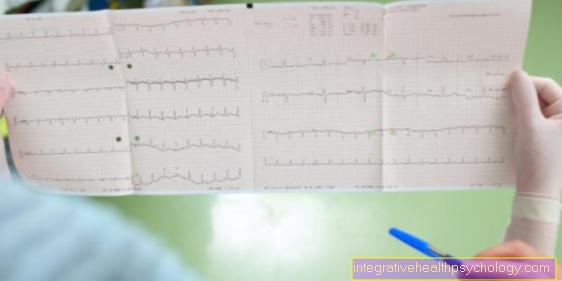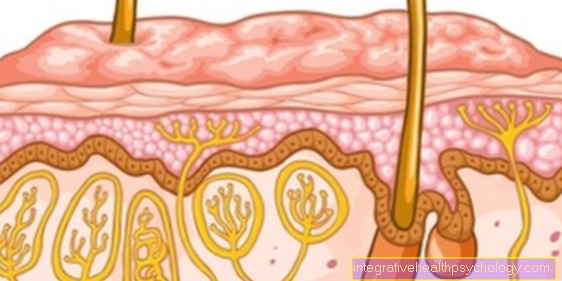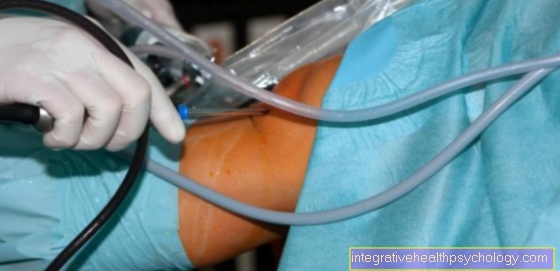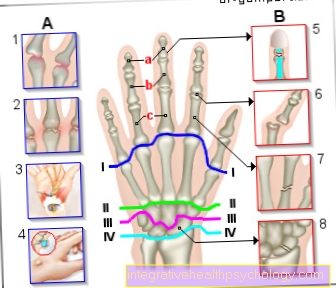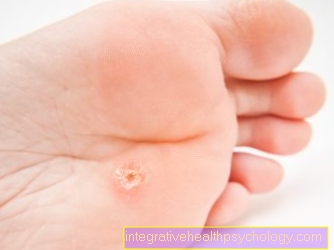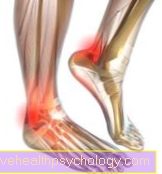Employment prohibition during pregnancy
What is the employment ban?
The employment ban is a regulation anchored in the Maternity Protection Act (MuSchG), which regulates whether and to what extent expectant mothers are allowed to work during their pregnancy or after giving birth. E.g. those activities are prohibited in which the life of the child or mother is in danger.
In addition, mothers are not allowed to take up employment 6 weeks before the birth or 8 weeks afterwards (Section 3 MuSchG).
In addition, the employment ban includes further bans on activities that deal with the working environment of the pregnant woman (Section 4 MuSchG). This is e.g. Health-endangering substances or particularly physically stressful working conditions.
In addition to a general employment ban for all expectant mothers, there is also an individual ban, which can also be issued under certain conditions.

What happens to the pregnant woman's salary?
If the doctor in charge pronounces an employment ban, the pregnant woman will still receive her full salary.
This is calculated from a period of 13 weeks or 3 months before the onset of pregnancy. This also applies if the employment relationship only started after the start of pregnancy. When calculating wages, no wage reductions that existed in the corresponding period of time and that have no fault of their own, such as short-time work, are included. Wage increases, e.g. as a result of collective bargaining, are however taken into account in the calculation.
Statutory insurance mothers are also entitled to maternity benefit within the protection periods before and after childbirth (6 weeks before the birth to at least 8 weeks afterwards). This amounts to a maximum of 13 euros per calendar day; any difference to the calculated salary entitlement is paid by the employer. Expectant mothers who are not members of a statutory health insurance company can apply for a one-off allowance of 210 euros.
Read more on this topic at: Maternity Benefit - Everything about the topic!
Who pays the pregnant woman's salary?
The calculated salary for the duration of the employment ban is paid by the employer. In the event that the mother-to-be receives additional maternity allowance, the employer pays the difference of 13 euros per calendar day to the calculated wage entitlement. However, the employee has the option of applying to his employee's health insurance company for reimbursement of the wage claim in order to reduce his own financial burden for the period in question. If the employer suggests other employment to the pregnant woman that does not fall under the employment prohibition that has been imposed on her, no lower wage than the one previously calculated may be paid out in this case.
Further information on this topic is available at: Maternity Benefit - Everything about the topic!
How do I get an employment ban?
First of all, the Maternity Protection Act stipulates a general prohibition of employment for all expectant mothers. This comes into effect as soon as the pregnancy becomes known, which the employee must inform her employer immediately.
An individual prohibition of employment, e.g. due to special, pregnancy-related complaints, can be issued by a resident doctor. He issues a corresponding certificate and decides on an extension or addition to the general ban. However, such a certificate is not always reimbursed by the health insurance company and must therefore be paid by the insured person in case of doubt.
It is possible to limit the ban to certain activities or working hours. The employer then has the option of offering the pregnant woman other work. When issuing a medical certificate, it should always be noted that the pregnant woman's complaints must not be caused by an illness, but must have their cause in the pregnancy and would be exacerbated by the work performed.
Can I go on vacation with a ban on employment?
In principle, you can also go on vacation when you are not allowed to work. In order to be sure of this, however, it is advisable to have a doctor attest to the harmlessness of a vacation trip in advance. You should also clarify this with your health insurance company beforehand so that you are on the safe side in the event of any problems with the employer.
The vacation entitlement of a pregnant woman is also regulated by law. If the vacation was granted by the employer before the employment ban came into effect and it falls within the period of the ban, the employee is entitled to take this vacation after the expiry of the protection periods, possibly also in the following year.
What reasons can there be for a ban on employment?
General reasons for an employment ban are laid down in the Maternity Protection Act.
For certain reasons, an exception can be made with the consent of the pregnant woman. There is a prohibition of employment from 6 weeks before delivery to at least 8 weeks afterwards. Another reason for a ban is the endangerment of the life of the child and mother through the activity carried out.
In addition, certain working conditions are a prerequisite for an employment ban. These include heavy physical work, harmful vapors, gases or dust (e.g. during woodwork), lifting heavy loads, standing for more than 4 hours from the 5th month, an activity with increased risk of falling as well as piecework or work on the assembly line. For the latter, an exception can be made by the supervisory authority.
An individual prohibition of employment can be issued by a resident doctor if the activity carried out carries the risk of complications for the pregnant woman, caused by certain individual accompanying symptoms of the expectant mother. For example, an already existing severe nausea, which is intensified by intense smells at the workplace, can be a reason for an individual prohibition of employment.
Which employment bans apply to kindergarten teachers?
After the EU Biological Agents Regulation came into force in 2005, a kindergarten is considered a high-risk workplace. Typical childhood diseases such as whooping cough, measles, mumps, (ring) rubella, chickenpox or the cytomegaly virus often have a more severe course in adults than in children and can also damage the unborn child.
If a kindergarten teacher becomes pregnant, she must inform her employer immediately. The latter is then obliged to release the pregnant woman from work until her immune status has been clarified. If there is sufficient immune protection for the diseases in question, the mother-to-be may continue to work at her place of work up to the general protection periods of the Maternity Protection Act (normally up to 6 weeks before delivery).
Should one of the above If there is insufficient protection against illnesses, a doctor must immediately and individually prohibit the pregnant woman from working.In individual cases, you can also move to an area with a lower risk of infection (e.g. office / administrative work).
Also read our topic: Rubella during pregnancy
Does the employment ban affect my parental allowance?
Parental allowance can be paid up to 14 months after the child is born. An employment prohibition pronounced during pregnancy has no effect on the amount of parental allowance, as its calculation is based on the salary of 12 months prior to maternity leave.
In the case of legally insured employees who are entitled to maternity benefit, the parental benefit must be offset against the amount of this claim. It is therefore necessary to apply for parental allowance for the first months of life after the child is born, even if maternity allowance is still valid for a period of 8 weeks.
Which employment bans apply during breastfeeding?
The Maternity Protection Act stipulates that breastfeeding mothers are not allowed to work if certain working conditions exist.
This prohibition applies, for example, to generally physically demanding work as well as increased risk of falling, working (peeling) wood, working in a predominantly stooped position or with heavy use of the feet and working in piecework.
Mothers who work while breastfeeding are also supported by the Maternity Protection Act. This can be the case if the child can either be taken to work or placed in a nearby day care center. If the mother cannot have the child near her during her working hours, the legally assigned breastfeeding times can be used for pumping. In the Maternity Protection Act, the mother is thus granted a period of one hour for breastfeeding.
If you work more than 8 hours, these times will be extended again. These assigned breastfeeding times are considered working time, and breastfeeding times may not be provided in advance or afterwards or accumulated. Further regulations on these statutory provisions can be made by the competent supervisory authority.
Is there an employment ban due to mental stress?
The justification of a prohibition of employment of a pregnant woman due to psychological stress can be lawful if a doctor issues a corresponding certificate. However, it must be clear from this that - as in other cases when an individual prohibition of employment is issued for pregnant women - this psychological stress is related to gainful employment and is caused and / or increased by the work performed. The burden of proof for the legality of such a prohibition lies with the employee.
A stressful situation alone, which was caused by pregnancy and occurs independently of the workplace, is not sufficient to justify an individual prohibition of employment due to a psychological stressful situation.
Does the employment ban look different if you are expecting twins?
When a child is about to be born, the Maternity Protection Act provides for periods of protection from 6 weeks before the birth to at least 8 weeks after the birth. If there is a twin or multiple pregnancy, these deadlines change accordingly.
An employment ban of 6 weeks before birth remains the same, while the protection period after delivery extends to 12 weeks. In the event that the birth occurs earlier than planned, the reduced period of protection before the birth (6 weeks) will be added to the period after the birth. Thus, in the case of a multiple birth, there is always a ban on employment for the entire period of 18 weeks over the period of the birth.
Find out more about this topic at: Twin Pregnancy - What You Should Know!
What happens to the overtime when you are banned from employment?
The Maternity Protection Act stipulates that periods of prohibition to work during pregnancy or immediately thereafter are periods of employment. As with the remaining vacation days, accumulated overtime is not lost.
The entitlement existing before the employment ban came into effect remains unaffected until the end of the protection periods. However, if necessary, the pregnant woman can agree on payment of overtime with her employer.
Learn more at: Maternity leave - you should know that!
Recommendations from the editorial team
- Maternity Benefit - Everything about the topic!
- Stress During Pregnancy - These Are The Effects
- Exercise During Pregnancy - What To Look For
- Nausea During Pregnancy - You Can Do It
- Prohibited foods during pregnancy
- Everything about the mother pass







